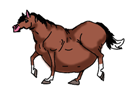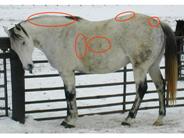 A fat horse is definitely not necessarily a happy horse. Overweight horses can be prone to a number of illnesses and injuries, including laminitis or founder, tendon injuries, colic, dystocia (difficulty in giving birth or foaling), or OCD (especially in young horses). They can also be more likely to develop Equine Metabolic Syndrome, a multifactorial disease which includes insulin resistance and equine cushings disease.
A fat horse is definitely not necessarily a happy horse. Overweight horses can be prone to a number of illnesses and injuries, including laminitis or founder, tendon injuries, colic, dystocia (difficulty in giving birth or foaling), or OCD (especially in young horses). They can also be more likely to develop Equine Metabolic Syndrome, a multifactorial disease which includes insulin resistance and equine cushings disease.
All of the above problems can be helped, if not prevented, by reducing the weight of the horse to normal.
What is normal? That depends on the horse. Your equine vet will be your best guide because he or she should be unbiased by their own horses. For example, a horse judged normal by a show person may be called fat by a racehorse trainer, whilst the opposite could also be true (a fit racehorse may be called skinny by a show rider). A vet would likely call both in good condition because they take the horse’s environment into careful consideration.
 A weightloss plan may include:
A weightloss plan may include:
- Restricted lush pasture access, and/or reduction of amount of feed. Weighing the feed is the first step, looking at type of feed the second.
- Overhaul of feed type (must be a gradual process to avoid upsetting the gut and causing colic). Feed should be suited to the individual horse, taking into account its metabolism, environment, age, exercise, breed and sex.
- Increased exercise. This should also be gradual. Overweight horses may be prone to overheating and sweating, which can result in dehydration and tying up. Any new exercise should therefore be introduced gradually to minimise the risk.
Some horses appear to have a horizontal line across their body; the area above this ‘line’ skinny and the area below it fat. These horses need to be assessed by an equine vet as it is possible they have:
1) Cushings
2) Metabolic Syndrome
3) Bad teeth
4) Fluid Accumulation
5) Diseased liver or kidneys
6)Worms
Or a few other less common ailments. This is why it may be essential for your ‘overweight’ equine to be assessed by an experienced equine vet, to rule out such diseases.









